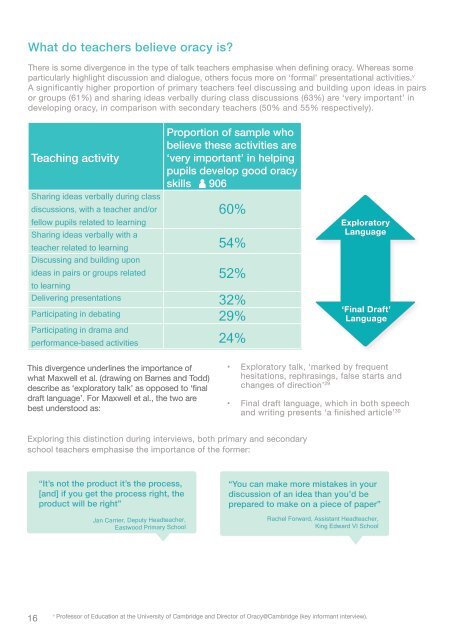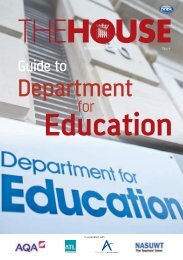Oracy
2fcBkno
2fcBkno
Create successful ePaper yourself
Turn your PDF publications into a flip-book with our unique Google optimized e-Paper software.
What do teachers believe oracy is?<br />
There is some divergence in the type of talk teachers emphasise when defining oracy. Whereas some<br />
particularly highlight discussion and dialogue, others focus more on ‘formal’ presentational activities. v<br />
A significantly higher proportion of primary teachers feel discussing and building upon ideas in pairs<br />
or groups (61%) and sharing ideas verbally during class discussions (63%) are ‘very important’ in<br />
developing oracy, in comparison with secondary teachers (50% and 55% respectively).<br />
Teaching activity<br />
Sharing ideas verbally during class<br />
discussions, with a teacher and/or<br />
fellow pupils related to learning<br />
Proportion of sample who<br />
believe these activities are<br />
‘very important’ in helping<br />
pupils develop good oracy<br />
skills 906<br />
60%<br />
Sharing ideas verbally with a<br />
teacher related to learning 54%<br />
Discussing and building upon<br />
ideas in pairs or groups related<br />
to learning<br />
52%<br />
Delivering presentations<br />
32%<br />
Participating in debating<br />
29%<br />
Participating in drama and<br />
performance-based activities 24%<br />
Exploratory<br />
Language<br />
‘Final Draft’<br />
Language<br />
This divergence underlines the importance of<br />
what Maxwell et al. (drawing on Barnes and Todd)<br />
describe as ‘exploratory talk’ as opposed to ‘final<br />
draft language’. For Maxwell et al., the two are<br />
best understood as:<br />
• Exploratory talk, ‘marked by frequent<br />
hesitations, rephrasings, false starts and<br />
changes of direction’ 29<br />
• Final draft language, which in both speech<br />
and writing presents ‘a finished article’ 30<br />
Exploring this distinction during interviews, both primary and secondary<br />
school teachers emphasise the importance of the former:<br />
“It’s not the product it’s the process,<br />
[and] if you get the process right, the<br />
product will be right”<br />
“You can make more mistakes in your<br />
discussion of an idea than you’d be<br />
prepared to make on a piece of paper”<br />
Jan Carrier, Deputy Headteacher,<br />
Eastwood Primary School<br />
Rachel Forward, Assistant Headteacher,<br />
King Edward VI School<br />
16<br />
v<br />
Professor of Education at the University of Cambridge and Director of <strong>Oracy</strong>@Cambridge (key informant interview).




